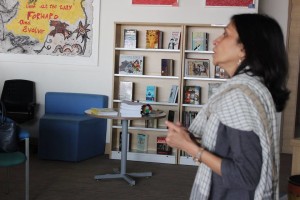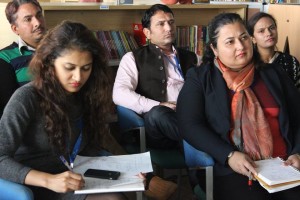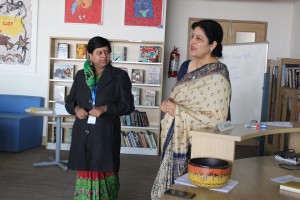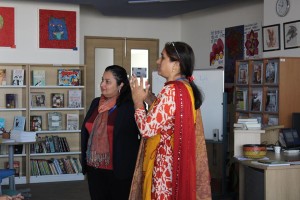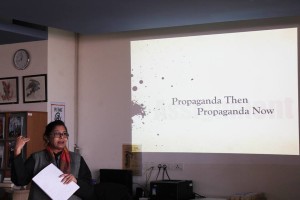It is always interesting meeting educators from different schools and across subjects and it becomes even more so when one is meeting them to talk about human rights and the Anne Frank story.
The teacher-training workshop on the Peaceworks Human Rights Defenders Module was held for 20 educators from the Delhi-NCR region on Tuesday, 28 November 2017 at the Shiv Nadar School, Noida.
After a brief introduction to PeaceWorks and the Anne Frank project, we began the workshop with introductions from each of the participants—by throwing a ball to one another—in a circle. After everyone was more or less familiar with each other’s names, we moved onto passing the ball to each other—announcing the name of the person we were passing the ball to as well as the change we would like to make in the world, or community or even in ourselves. This was a fun round, because of course we forgot names, but it was also very interesting because of the sharing and the diverse ways in which people want to make a difference. Some of these ways included respect towards one another, inclusion-particularly of those that have differential needs, cleanliness and women’s rights.
We then discussed the Diary of a Young Girl and the Anne Frank story. Participants shared their experiences when they first read the book. Some shared that it was through the book and because of the book that they really understood what happened during this time and that it lead to further reading about the Holocaust. One of the teachers spoke about how her students reacted when they first read the book. They had read the version that had censored some of the details about Peter and Anne. How does one address an issue like this? Talk about it? Or not?
Meena Malhotra answered this question by first explaining the reasons behind the censorship of the book and then addressed the fact that while it is important to not sweep the issue under the rug, it is also important to first assess ones students—understand their levels of maturity.
In that context, one of the teachers spoke about how it is difficult for students to relate to what has happened way back in the past. This point actually lead very nicely into our next activity which was done in groups—where each group had to discuss the relevance of the Anne Frank story in todays world and how they would use it in their classrooms.
One of the groups spoke about how human rights education is a very vast topic and cannot really be defined. They then spoke about how the Anne Frank story can be used to discuss empathy and the ‘importance of being happy’ and the value of gratitude. Many young people today have the means to dream and no real constraints, whereas Anne Frank lived in a reality where there was no future, but she did not let go of her dreams. Another group spoke of the book as the evolution of a young girl. One of the participants spoke about how she relates living together in a restricted way—as Anne did—with Big Boss, a popular reality show. She also spoke about how the book teaches us ‘a survivor spirit’. The emotions that Anne had are also very relatable to the present world. This group felt that it is not possible to keep what had happened during the Holocaust away from the present—what with Syria, ISIS and so on—something that children are very much aware of, thanks to MUN and other such activities. These topics and the topic of the Holocaust can be introduced to children at a younger age, using age appropriate resources— books and movies. Another group spoke about how the book can be used in English classes as a tool to improve creative expression, diary writing and so on. The history teacher can use the book to teach the Second World War.
The Human Rights Defenders module, developed by PeaceWorks as a resource for teachers deals with the story of Anne Frank and the Holocaust, bringing into the narrative other human rights violations that have occurred over the years. Each has activities based on the arts—be it literature, film or fine arts. After a brief presentation on the module, we moved onto the next activity—Propaganda Then and Propaganda Now. Again, in groups, the participants discussed aspects about Propaganda—such a critical component of Hitler’s strategy—then and now. The participants agreed that propaganda has evolved a lot in terms of content and ways of dissemination—given that now social media plays such a huge role in how we get our information. Content is also much less focused.
We then moved onto a brief discussion on community projects on human rights that can be done in the participant’s schools. Some shared programs that have been done or are in the pipeline in their schools.
We ended the workshop by screening Hetain Patel’s TED talk on Identity—a fun and interesting way to deal with a complex issue.
– Paroma Sengupta
Learning to Live with Difference: A resource for teachers to engage with high school students in the understanding of human rights and inspiring them to become human rights defenders. This supplementary module serves as a starting point for teachers to build upon using current events and their own creativity.
If you wish to use the module in your school, write to us at peaceworks@seagullindia.com

